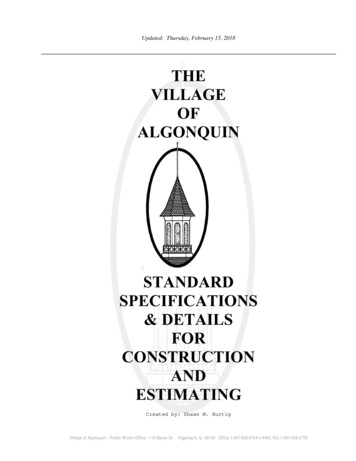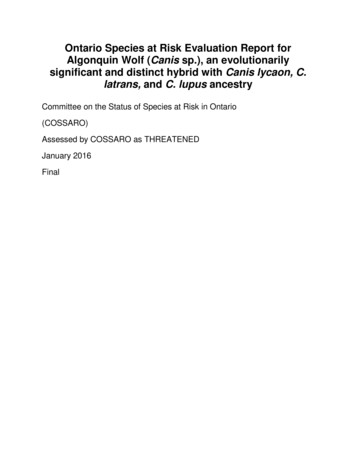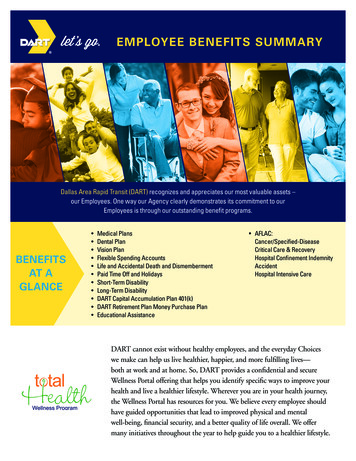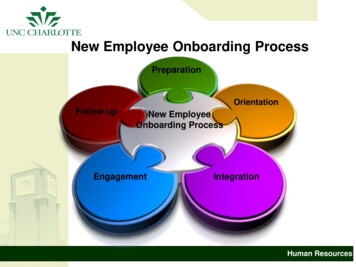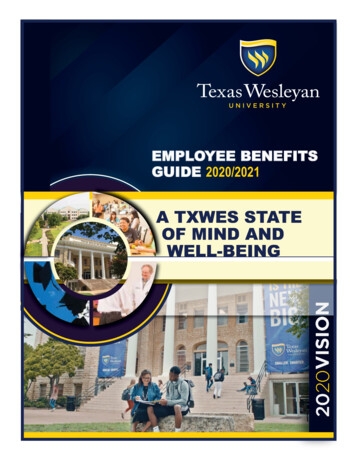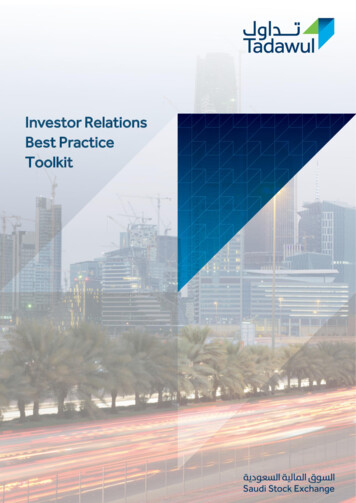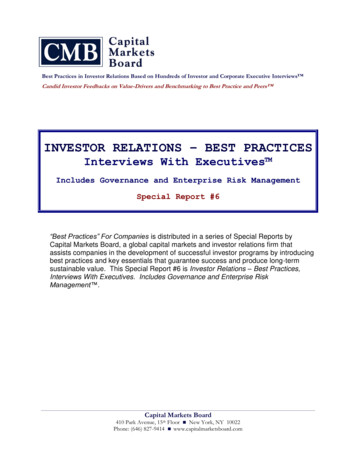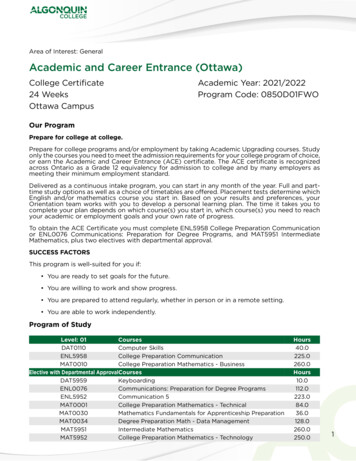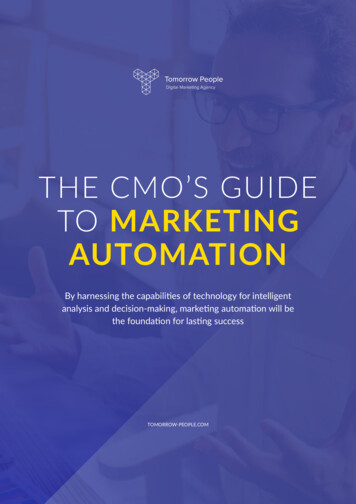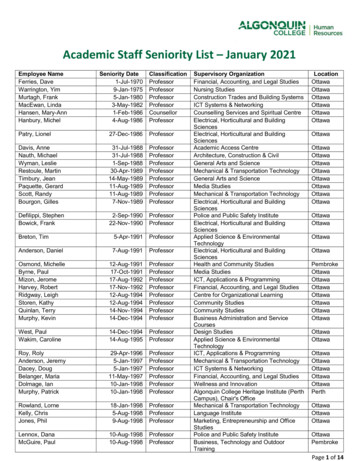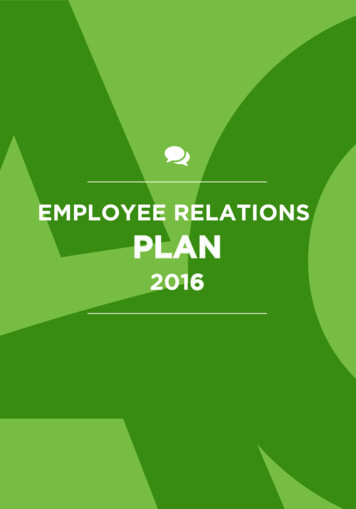
Transcription
EMPLOYEE RELATIONSPLAN2016The President’s Listening Tour 2014 1
INTRODUCTIONIn 2014, our President, Cheryl Jensen, embarked on her Listening Tour to understand theopportunities and challenges facing our College. One of the opportunities identified throughthat process was a focus on Union-Management Relations. The opportunity was captured inthe President’s Listening Tour final report as follows:“Faculty, staff and administrators all raised the opportunity that surrounds improved labourrelations. They recognized that the current combative approach serves neither side well andexpressed a sincere hope that both sides would begin to work collaboratively. Those whoraised the topic talked wishfully about the opportunity that constructive relations could bringto the College and our students.”Significant work has taken place to seriously address this opportunity and to provide a pathforward for Algonquin College in order to more meaningfully engage with our union partners,in a way that is sustainable over time. The entire leadership team and management groupworked together to develop a vision statement and guiding principles that will guide ourdiscussions with our partners. The result of that work is the development of this EmployeeRelations Plan.The Employee Relations Plan is a living document that is subject to change based on thedynamic nature of the labour relations environment and to reflect that changes will evolveover time as the Plan is actioned.The high level of participation in the development of this Plan and the formulation of the pathto move forward was an encouraging sign of the commitment of everyone involved to takeon this work with open minds and a sustained commitment to realize positive change inUnion-Management relations.The Employee Relations Plan is ambitious, but one that we believe is worth the investment inorder to create the necessary cultural shift at all levels within Algonquin College and with ourunion partners and stakeholders. It should be noted that many of the initiatives proposed arefrom the perspective of all levels of management.As our union partners become involved in this new approach, the initiatives andrecommendations must remain flexible and open to change based on their input andengagement. This document may be revised at any time through this consultative process, inthe best interests of all parties.2 The President’s Listening Tour 2014Employee Relations Plan March 2016 3
VISIONGUIDING PRINCIPLESAs partners, we will be guided by the following principles:Algonquin College will be known forits productive union-managementrelations within a culture of pro-activeand respectful joint-problem solvingto support all employees and promotestudent success.1. FACT-BASED PROBLEM SOLVING. Decisions are made usingmutually agreed facts.2. TRANSPARENCY. Information is shared to enhance commonunderstanding and awareness.3. INCLUSIVITY. Input is sought from all stakeholders regardingimportant business decisions.4. ACCOUNTABILITY. Responsible for behaviours, decisions, andactions.5. FOCUSED ON INTERESTS. Centered on the needs that are mostimportant to all of us.4 The President’s Listening Tour 2014Employee Relations Plan March 2016 5
2016/2017 Goals1. Managers are prepared and equipped to solveproblems.2. Managers understand where to find information andhow to use it in order to make decisions.3. Managers assign work and workload in a mannerconsistent with the collective agreement.4. Managers take a leadership role in building andmaintaining a positive union-management relationship.
Goal 1: Managers are prepared and equipped tosolve problems.1A - Delivery of targeted trainingprogram for all managers.1B - Additional support provided tomanagers by HR, LR, and Executive/Leadership Teams, and peer networks.1C - Clarification of roles and responsibilitiesof those within the organization (LR, HR,managers) and those external to theorganization (unions, provincial partners) asit relates to Employee Relations.Development and delivery of a 7-module training program toall college managers that includes both skills training (SWFs,Salary Calculations, Classification) and competencies training(Communication, Problem Solving, Relationship Building,Trust). The purpose of this training is to (a) better equipmanagers to resolve issues and improve employee/labourrelations within their own departments, both with employeesand union representatives, and also to provide them with thetactical skills and knowledge regarding key issues in order todo so. Each module is delivered in half-day sessions for a totalof 3.5 days of training for all academic managers and 2.5 daysof training for non-academic managers. ACET and ACLTmembers will be included in training.During consultation phases with the leadership team andmanagement group, a consistent theme from participants wasthat they required more support in order to address issues intheir departments in a timely and effective manner.As we move forward with the Employee Relations Vision andGuiding Principles, it will be important for all stakeholders tounderstand the roles and responsibilities of those involved,both as it pertains to our own internal resources and thoseexternal to college management. Understanding these intraorganizational and inter-organizational drivers will better equipall parties to engage with one another more productively, withreduced duplication of effort and greater respect for the role ofthe other party. With respect to our union partners, the Collegewill seek out and encourage formal and informal opportunitiesto exchange information regarding roles and responsibilitiesgenerally, in order to increase shared understanding andappreciation about how best to engage in joint problem solvingstrategies.OPSEU Locals 415 and 416 Executive Committees will beinvited to attend the sessions jointly with management staff.Key supporting individuals include:1.ACLT representatives - for regular access, mentoring,and advice on people management issues;2.ACET representatives - for advice regarding areawide or college-wide people management issues;3.Peer Networks – for general support and sharing ofbest-practices regarding common issues and approaches on avariety of issues, both formally (e.g., Chairs Council) andinformally (e.g., Peer Mentoring);4.HR experts – for advice and consultation regardingmatters of policy and people management issues; and,5.LR experts – for advice on complex matters and/ormatters related to labour and employee relations, most often inperson and in advance of formal meetings with unionrepresentatives.8 Employee Relations Plan March 2016SHORT-TERMSupport can mean different things to different people. Broadly,feedback indicated that effective support included the abilityfor managers to have timely access to key individuals in orderto obtain input and feedback regarding challenges they arefacing on a daily basis. Effective support also meant thatmanagers were given permission to apply their problem solvingskills in a safe environment where they are then givenconstructive feedback.MEDIUM-TERMANDONGOINGWithin the management structure, there needs to beclarification of the roles within HR and the line manager as itrelates to people management issues. Further toRecommendation 1-B, the role of the Dean/Director needs tobe articulated as a support person to the manager in thisregard. By doing so, an accountability framework isestablished which will guide how we approach and manage ourpeople related matters. Identification of core leadershipcompetencies will also inform management job design,recruitment practices, orientation, and professionaldevelopment.This process will be iterative and informed based on ongoingconsultation, feedback, and/or grievance and arbitrationactivity.MEDIUM-TERMANDONGOINGEmployee Relations Plan March 2016 9
Goal 2: Managers understand where to findinformation and how to use it in order to makedecisions.2A- Delivery of targeted training programfor all managers.See 1-A.10 Employee Relations Plan March 2016SHORT-TERM2B - Complementing the Initiative/Action2C, consult with a small sample of keyoperational representatives in order todetermine additional resources or datasources which could be developed formanagers on issues related to EmployeeRelations and/or Human Resources.2C - Identification of existing information anddata sources from across the college relatedto key employee relations and HR issues;collation and communication to collegemanagers regarding same.Through conversations or small focus groups of keystakeholders (including OPSEU Locals 415 and 416), an HRresource may be assigned to create a list of resources whichare currently not available, but would be beneficial, to collegemanagers as they manage people issues on a day-to-daybasis. These resources could be the form of documents,website content, or other references, and would allowmanagers to access information on an as-needed basis andindependently – without necessarily having to access HR or LRsubject matter experts in order to obtain basic or standardizedinformation or direction.There are many resources that exist in the college whichwould assist managers in addressing employee relations andHR issues in their department. Managers may be unawarethat these resources are available, they may not know whereto find them, or they may have outdated versions. Providingmanagers with a current listing of up-to-date resources anddata sources should assist them in identifying possiblesolutions independently or with limited intervention fromother support persons. Common references and sources willassist with a more consistent college-wide approach ontacticalissues.MEDIUM-TERMIn order to ensure transparency, OPSEU Locals 415 and 416will be provided with an opportunity to submit inputregarding processes and/or publicly available resourceswhich may have a direct impact on them or theirmembership.LONG-TERMEmployee Relations Plan March 2016 11
Goal 3: Managers assign work and workload ina manner consistent with the collectiveagreement.3A - See 1-A, specifically the delivery of targeted trainingprogram for all managers in the areas of (1) SWFs, (2) SalaryCalculations, and (3) Classification.3B - Creation of an accountability framework forSWF assignments.These specific skills-focused training modules will be offered to all college managersover the course of three half-days. Designed to address key areas of concern identifiedby OPSEU Locals 415 and 416, managers will be provided with the necessary tacticalskills in order to assign work and workload in compliance with applicable provisions ofthe collective agreements, the Colleges Collective Bargaining Act, and college policies.Multiple sessions will be offered in partnership with the Deans for all Chairs with bestpractices and norms in each of the schools and faculties being discussed. These sessionswill be complemented by the other four competency-based training modules.In order to ensure that Academic Managers are properly supported in assigning academicworkload, and commencing with the next round of workload assignments, the Deans willput a mechanism in place to ensure accuracy of assignments.OPSEU Local 415 and 416 Executive Committees will be invited to attend the sessionsjointly with management staff.12 Employee Relations Plan March 2016SHORT-TERMFollowing completion, the SWFs shall be submitted by normal process to HumanResources, where they will be reviewed in a timely manner by the assigned resource inorder to ensure compliance with college-wide requirements. The HR resource will beaccountable to identify and track inconsistencies, errors, and/or frequent issues raised bythe union in order to better inform the process at all levels. The HR resource will be ableto produce metrics for ACET upon request.SHORT-TERMEmployee Relations Plan March 2016 13
Goal 4: Managers take a leadership role in buildingand maintaining a positive union-managementrelationship.4A - Delivery oftargeted trainingprogram for allmanagers.4B - Inclusion of anEmployee Relationsfocused goal for all2016/17 performancecontracts forAdministrators.4C - Request the reestablishment ofacademic joint unionmanagement committeesunder the collectiveagreement.4D - HR (LabourRelations) report will beprovided to ACET andACLT on a quarterlybasis.4E - Creation of a“Collaboration Space”for employee relationsactivities.See 1-A.Building on the guiding principle ofAccountability, the inclusion of anEmployee Relations-focused goal inall 2016/17 performance contracts isa signal to the organization and ourunion partners that this issue isbeing taken seriously at all levels ofmanagement. Managers shouldbuild outcomes and metrics in sucha way as to demonstrate how theyare taking a leadership role withintheir own departments, both withemployees and unionrepresentatives, in order to realizethe Vision set out by ACET.The academic collective agreementprovides for two local joint unionmanagement committees – theCollege Employment Stability Fund(CESC), which addresses issuesrelated to job security and layoff,and the Union College Committee(UCC), which is a forum for broaddiscussion on issues arising from thecollective agreement which impacton the bargaining unit and/or theunion-management relationship.Both of these committees have beendormant for several years and theirre-establishment could provide aforum for productive discussion ofissues that impact both the collegeand the union without having toresort to the grievance/arbitrationprocess. Note: Both the CESC andthe UCC committees operatesuccessfully with OPSEU Local 416and have increased the level ofcommunication and our ability toresolve issues generally between theparties.In keeping with the guidingprinciples of Transparency and FactBased Problem Solving, LabourRelations will provide a quarterlyupdate to the Executive andLeadership Teams regarding keymetrics and trends with the purposeof informing executive decisionmaking and monitoring progress.The update shall also includediscussion regarding emerging issuesand labour relations strategies thatare relevant to the Executive Teamand Leadership Team. Samplemetrics could include: grievancesfiled per bargaining unit, individual vsunion grievance numbers, status ofgrievances (e.g., settled, withdrawn,referred to arbitration), ongoingarbitrations, etc. The purpose of thereport will be to inform executivestrategy and decision making as itrelates to issues that may impact onunion partners and stakeholders andto monitor progress.Leadership team and Managementgroup feedback indicated that accessto labour relations experts and HumanResource Officers for face-to-facemeetings is something that is notresourced appropriately at the presenttime. This included the ability to meetin advance of formal meetings with ourunion partners in a safe and privateenvironment where cases can be freelydiscussed. It also included aconfidential space where managersmight potentially meet with employeesand/or union representatives toproblem-solve sensitive issues relatedto labour and employee relations.Generally speaking, Labour Relationsbooks dozens of meetings across theCollege each week but does not havededicated meeting space, which oftenresults in meetings being held in lessthan-ideal locations and within tightlyconstrained periods of time.SHORTTERM14 Employee Relations Plan March 2016SHORTTERMMEDIUMTERMMEDIUMTERMThe idea of a dedicated CollaborationSpace, which would include office andprivate meeting space, would enableLabour Relations and Human ResourcesOfficers to conduct the necessarymeetings with managers, employees,and union partners in order to attemptto resolve issues face-to-face andearlier in the process. A physical spacein which the work of employee relationscould operate would increase thequantity and quality of support whichcould be provided to college managers.MEDIUMTERMEmployee Relations Plan March 2016 15
EMPLOYEE RELATIONS TRAINING PLANA need for a universalmanagement training programin the areas of employee/labourrelations and peoplemanagement was identified ascrucial to the success of thisplan. Three distinct butcomplementary training deliveryformats – largely related to thetiming of the training – that willcontribute to long-term success.The short-time goal of training within this plan is focused on a “Reinforce” delivery model, where existingstaff are provided with in-depth seminars and workshops to build capacity for skills and competencies thatneed to be created or expanded. The content will then be modified in the context of a more robust trainingand development model for the future, in order to be delivered in the “Ready” and “Refresh” formats.10 The President’s Listening Tour 2014The President’s Listening Tour 2014 11
SKILLS TRAINING*Although designed for academic managers, registration will not be restricted.18 Employee Relations Plan March 2016Employee Relations Plan March 2016 19
COMPETENCY TRAINING20 Employee Relations Plan March 2016Employee Relations Plan March 2016 21
22 Employee Relations Plan March 2016Employee Relations Plan March 2016 23
14 Employee Relations Plan March 2016 Employee Relations Plan March 2016 15 4A - Delivery of targeted training program for all managers. See 1-A. 4B - Inclusion of an Employee Relations-focused goal for all 2016/17 performance contracts for Administrators. Building on the guiding principle of Accountability, the inclusion of an
